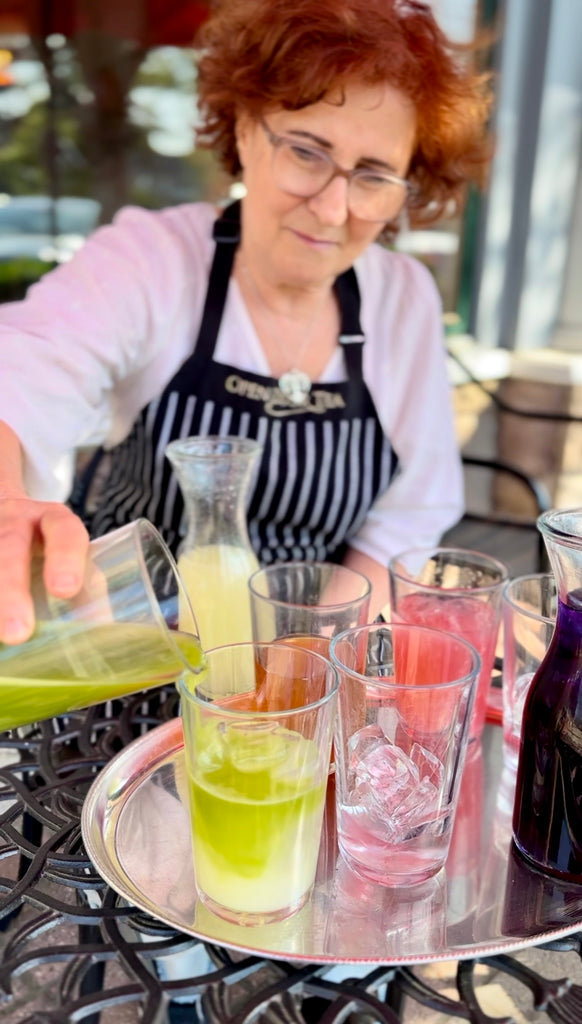The Surprising Synergy of Matcha & Lemonade
Posted by DYLAN LINDEBERG

Hold the milk and bring on the lemons 🍋. You may already know that matcha is packed with health benefits - it's one of the few green teas where you consume the whole leaf. You may also know that lemons, and Vitamin C, can boost the immune system (like Emergen-C). Now, research shows that combining the two can have synergistic health benefits, whereas your dairy latte might actually be working against you. Let's dig in.
The combination of matcha and lemonade may help increase the potency of antioxidants for several reasons:
- Synergistic Effect: The polyphenols found in matcha and the vitamin C in lemonade can have a synergistic effect. Vitamin C is known to enhance the absorption of catechins, a class of polyphenols found in matcha, up to . Catechins are powerful antioxidants that help neutralize harmful free radicals. (1)
- Matcha: Matcha is a form of green tea where the entire leaf is ground up and consumed. This makes it particularly high in catechins, especially epigallocatechin gallate (EGCG), which is believed to be a powerful antioxidant. (2)
- Lemonade: Lemons are high in vitamin C, another potent antioxidant that can neutralize free radicals. Vitamin C also aids in regenerating other antioxidants within the body. Moreover, the acidic nature of lemon can help improve the stability and bioavailability of catechins in the body, meaning they can be better absorbed and utilized. (3)
- Alkalizing Effect: The alkalizing effect of lemons can also help to counterbalance the slightly more acidic nature of matcha, making it up to 20% easier for the body to process and utilize the antioxidants present in the drink. (4)
So what about the beloved matcha latte? Unfortunately, some research shows that dairy milk reduces and blocks antioxidants to varying degrees in tea, coffee, and other foods that contain high levels of antioxidants like fruits. A meta-analysis of tea and heart health showed that tea reduced heart disease in all countries except Britain and Australia, two places known for commonly adding milk to their tea (5). This effect is thought to occur because the milk protein casein binds with antioxidants, reducing their ability to fight harmful free radicals (6).
Overall, the combination of matcha and lemonade is not only delicious and refreshing but it also potentially boosts the beneficial antioxidant properties of both ingredients. So next time, skip the milk and mix your iced matcha with lemonade!
Sources:
- Intra J, Kuo SM. Physiological levels of tea catechins increase cellular lipid antioxidant activity of vitamin C and vitamin E in human intestinal caco-2 cells. Chem Biol Interact. 2007 Aug 30;169(2):91-9. doi: 10.1016/j.cbi.2007.05.007. Epub 2007 May 31. PMID: 17603031; PMCID: PMC1965493.
- Kochman J, Jakubczyk K, Antoniewicz J, Mruk H, Janda K. Health Benefits and Chemical Composition of Matcha Green Tea: A Review. Molecules. 2020 Dec 27;26(1):85. doi: 10.3390/molecules26010085. PMID: 33375458; PMCID: PMC7796401.
- Lobo V, Patil A, Phatak A, Chandra N. Free radicals, antioxidants and functional foods: Impact on human health. Pharmacogn Rev. 2010 Jul;4(8):118-26. doi: 10.4103/0973-7847.70902. PMID: 22228951; PMCID: PMC3249911.
- Zimmermann, B. F., & Gleichenhagen, M. (2011). The effect of ascorbic acid, citric acid and low pH on the extraction of green tea: how to get most out of it. Food chemistry, 124(4), 1543-1548.
- Peters U, Poole C, Arab L. Does tea affect cardiovascular disease? A meta-analysis. Am J Epidemiol. 2001 Sep 15;154(6):495-503. doi: 10.1093/aje/154.6.495. Erratum in: Am J Epidemiol 2002 Apr 15;155(8):781. PMID: 11549554.
- Bourassa P, Côté R, Hutchandani S, Samson G, Tajmir-Riahi HA. The effect of milk alpha-casein on the antioxidant activity of tea polyphenols. J Photochem Photobiol B. 2013 Nov 5;128:43-9. doi: 10.1016/j.jphotobiol.2013.07.021. Epub 2013 Aug 20. PMID: 24001682.


